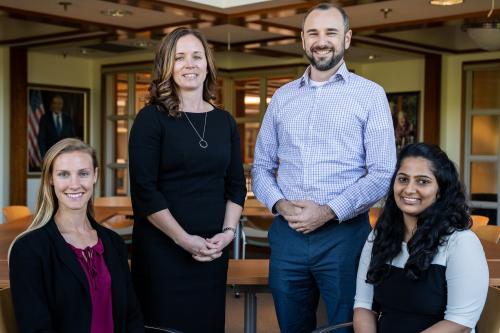
Last spring, Ashwini Sunil Deshpande MPP’20 began working on her first-year MPP consulting project: absenteeism in North Carolina elementary schools. She thought her background with an educational nonprofit in India gave her an advantage, especially her experience implementing surveys. But when she heard two absences a month was considered chronic absenteeism, her first thought was, “Is this even a problem?”
In rural India, only 75 percent of the class was present on any given day. “It took me time to understand how even two days of absenteeism a month impacts outcomes,” she said.

Team member Danelle Gamble, the mother of a young son and an active duty officer in the U.S. Army, also was skeptical at first. “I felt it was research, I didn’t see the policy connection,” she said.
Getting MPP students out of their comfort zone is part of the point of the project, according to Tim Nichols, who served as the faculty advisor for the team.
The first-year students are divided into teams by professors who teach the core courses. Through a survey-based selection system, the teams are then assigned projects submitted by potential clients. Students are sometimes disappointed at first with the clients they are paired with, Nichols said. That feeling often evaporates, Nichols said, when students realize the impact their project can have.
“These small NGOs in particular really relish the help. They leverage the talent of our students to deal with real problems,” he said.
Deshpande and Gamble were members of a four-person team of MPP students assigned to work with the North Carolina Early Childhood Foundation (NCEF.) The other two members had been teachers. Nicole Santeiro taught in a Florida high school and had worked on an evaluation project with Teach for America. Sean Ryan taught Spanish in an elementary school and created a program for middle school special education students.
This team did have an unexpected advantage. It was the second year in a row that NCECF had worked with an MPP consulting team on the issue. At the beginning of their work, Augie Gonzalez MPP’19 talked with the team about his group and working with the client.
Chronic absenteeism in elementary school is linked to poor academic performance and higher dropout rates in higher grades. In North Carolina, 14.8 percent of elementary students are chronically absent and in some counties, the rate is as high as 23 percent.
NCECF had been working with several partners for three years on the issue of chronic absenteeism in an initiative called AttendaNCe Counts. They posed this policy question to the team: “Based on what works, what can schools and communities do to reduce chronic absenteeism in pre-schools and elementary schools?”
The team first developed a scope of work in consultation with the client. They would conduct a statewide absenteeism survey, interview school administrators to identify local bright spots and conduct a literature review of national best practices.
The team surveyed 30 statewide education organizations in February, looking for responses from principals, teachers and community partners. They received 180 responses in the first five days. They reached out again to areas and populations that had low rates of participation.
“We all jumped in to get more responses because we believed in the project,” said Gamble.
The team used the surveys to identify “bright spots,” or schools and organizations that were having success in reducing absenteeism. They interviewed people at six schools to create case studies of best practices in the state. Five of the schools had high numbers of low-income students, ranging from 48 to 91 percent.
The literature survey of best practices across the nation informed their final recommendations. One of those examples was the Duke Early Truancy Prevention Project, research conducted by Sanford Professors Phil Cook and Ken Dodge with partners at the Center for Child and Family Policy. The project included home visits from teachers, increased communications between parents and teachers, and better tracking.
The students’ final report had four policy recommendations: Increase awareness, increase and distribute support personnel, train and support a data manager, and strengthen school and community collaboration.
The team was pleased with the final product and proud of the impact four people could have.
“They valued us as partners,” said Santeiro.
“I do tell people about this, about being able to work end-to-end as a group,” she said.
Ryan added, “I now have a deeper connection with North Carolina, after listening to all these people across the state. I also appreciate the ability to do applied work in graduate school.”
NCECF took the case studies directly from the team’s final report and rolled them directly into their 2019 AttendaNCe Counts report that was issued this fall. The rest of the document drew on the students’ survey results and incorporated the team’s findings. NCECF shared other elements of the team’s best practices recommendations through a state wide press release and blog posts at Education NC.
